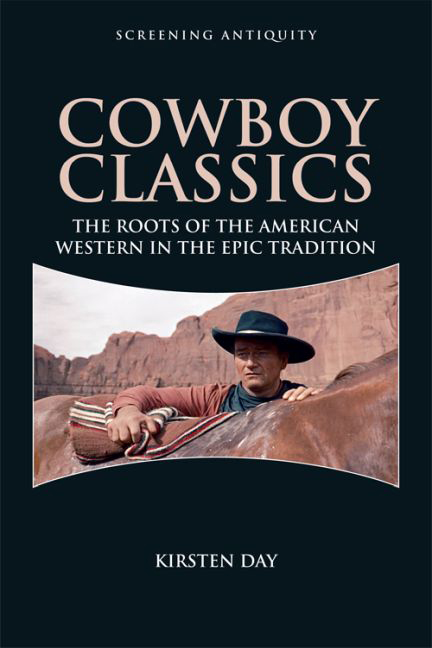Book contents
- Frontmatter
- Contents
- Series Editors’ Preface
- Acknowledgments
- Illustrations
- Prologue
- Introduction: Western Film and the Epic Tradition
- 1 Howard Hawks's Red River
- 2 Fred Zinnemann's High Noon
- 3 George Stevens's Shane
- 4 John Ford's The Searchers
- 5 John Ford's The Man Who Shot Liberty Valance
- Conclusion
- Bibliography
- Filmography
- Index
Conclusion
Published online by Cambridge University Press: 23 September 2017
- Frontmatter
- Contents
- Series Editors’ Preface
- Acknowledgments
- Illustrations
- Prologue
- Introduction: Western Film and the Epic Tradition
- 1 Howard Hawks's Red River
- 2 Fred Zinnemann's High Noon
- 3 George Stevens's Shane
- 4 John Ford's The Searchers
- 5 John Ford's The Man Who Shot Liberty Valance
- Conclusion
- Bibliography
- Filmography
- Index
Summary
While the Western genre at a glance may seem to have little in common with the oral poetry of Homer or with Rome's most elite literary epic, they show remarkable similarities in their use of myth and history to reflect and shape national identities and prevailing ideologies. Their close kinship is often suggested in the rhetoric of film scholars, whose descriptions of the function of Westerns often apply equally well to ancient epic, as we see in Robert Pippin's statement that
one of our mythic forms of self-understanding [in the United States] … could be said to be the very best Hollywood Westerns. They deal with a past form of life that is self-consciously treated as gone, unrecoverable (even if still quite powerfully and somewhat mysteriously attractive) and … many tell a basic and clearly troubling, complicated story of a traumatic, decisive political transition, the end of one sort of order and self-image and the beginning of another.
Like epic did for antiquity, then, Westerns help us grapple with identity issues in a way that is relevant yet comfortably distanced, and for this reason they have proven remarkably resilient despite occasional pronouncements that the genre is dead. The past decade, for instance, has seen remakes of 3:10 to Yuma (2007) and True Grit (2010), a film adaptation of Cormac McCarthy's novel No Country for Old Men (2007), a postmodern re-envisioning of the spaghetti Western in Django Unchained (2012), the family-friendly computer-animated feature film Rango (2011), as well as at least two popular and acclaimed post-Deadwood TV series in FX's Justified (2010–15) and A&E/Netflix's Longmire (2012–).
Moreover, just as the characterization of the epic hero in Homer and Virgil's works reflected and shaped notions of idealized virtue for men in ancient Greece and Rome, the Western hero as he is presented in film has become a pervasive and persistent model for idealized American masculinity more generally.
- Type
- Chapter
- Information
- Cowboy ClassicsThe Roots of the American Western in the Epic Tradition, pp. 198 - 201Publisher: Edinburgh University PressPrint publication year: 2016



